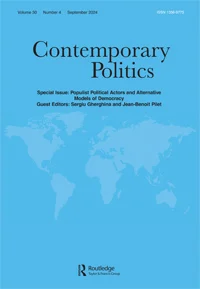Political parties use electoral clientelism to augment their support in many societies around the world. Extensive research shows how parties use clientelism and how citizens’ attitudes towards clientelism are shaped by broad social and economic factors. However, we know little about how political parties can influence people’s attitudes towards clientelism. To address this gap in the literature, this article analyzes the extent to which the development of a party organization and the interactions of citizens with these organizations can favor the acceptance of electoral clientelism as a practice of the political game. The analysis uses individual-level data from an original nationwide survey conducted in 2021 on a national representative sample of 4313 respondents in Romania. The results indicate that political parties, through their activities and networks, are not only main users of clientelism but also important drivers for its acceptance in society.





